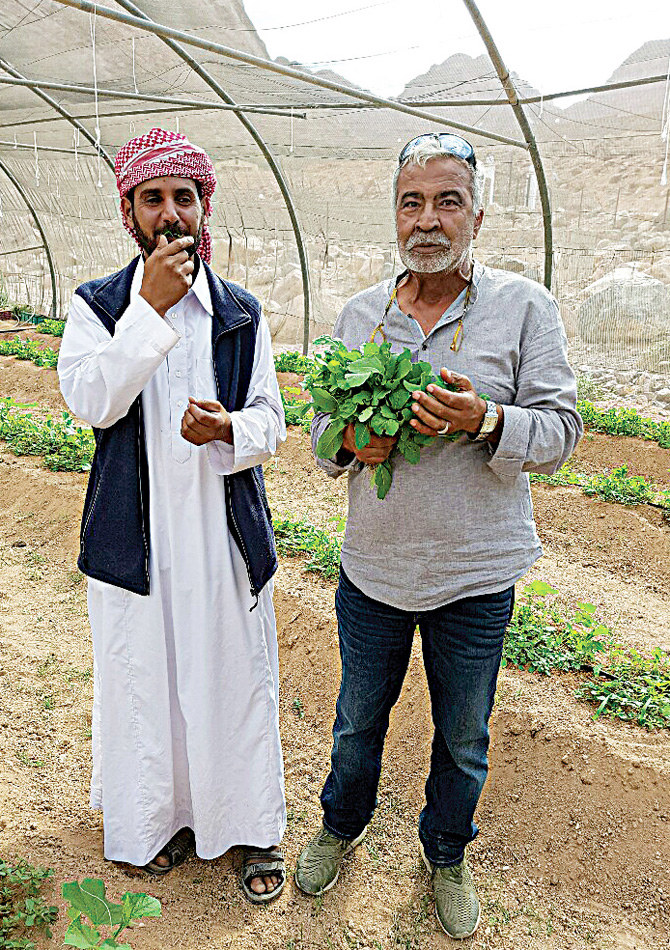CAIRO: “Community is everything, surround yourself with beautiful souls and watch what happens. So much love, I feel it bubbling out of my chest,” writes Madison Cooper.
The experienced yoga instructor and assistant manager at The Kings Arms pub and music venue in Salford, UK, said this when describing her experience in the Habiba village, a remote beach community in the middle of Egypt’s South Sinai desert.
It was this feeling of peace and tranquility that brought Cairo-born Maged El-Said and his Italian wife Lorena to the Egyptian port city of Nuweiba to settle and eventually start the Habiba community in 1994.
The community is a village that hosts an eco-friendly beach lodge, an organic farm, the Sinai Palm Date foundation and a learning center partnered with universities and organizations around the globe to promote a new form of educational tourism by hosting professional certification courses in permaculture and agriculture ecosystems.
More than 90 percent of Egypt’s land is covered by deserts, Sinai being part of the Eastern desert that occupies more than 20 percent of the country’s surface area, with very few populated villages and cities along the Red Sea coastal strip.
“I am sure there is enormous potential to invest in our huge deserts. The hidden value is in the people if we learn from each other the best way of integrating management of resources,” El-Said said.
This, however, is easier said than done: El-Said, who is now in his sixties, spent almost 20 years taking “agritourism” from a concept to a meaningful business.
He succeeded in 2009, when tourists started coming to volunteer at the organic farm merely to enjoy the experience of isolated serene living.
Before that, El-Said spent several years doing a series of seminars and workshops and inviting local and international experts in organic farming to discuss the agritourism model.
His first introduction to the field was in Italy, where he earned his bachelor’s degree in Italian language and literature in the 1970s.
Italian agritourism gained traction around the time when the agricultural business became less profitable.
Farmers in Italy were giving up, transforming their farms and farmhouses into vacation homes where tourists could stay and experience farming.
“People come to enjoy the beautiful nature and the serene surroundings, eat clean food and leave with fresh ideas and a new perspective on life,” said El-Said when explaining the concept of agritourism.
While the idea is widespread in the US and many European countries, it remains nascent in MENA. Sporadic trials around the region are currently under way, including a licensing program launched by the Saudi Commission for Tourism and Antiquities for farms willing to explore the concept and offer agritourism services.
Expanding the scope of its target community, the Habiba learning center has been working toward hosting a series of certificate program.
Among them are an internationally recognized Permaculture Design Certificate course that provides an introduction to sustainable living systems for a wide variety of landscapes and climates.
The move is intended to attract a more professional interna- tional audience and establish a new breed of educational tourism. El-Said has an ambitious plan for the future, hoping he can establish a desert research hub within his community and start replicating the model in other Egyptian resort cities by the year 2025.
“It is challenging but beautifully rewarding; people are resistant to change, but when they see a working model, it becomes easy for them to follow,” he said.
• This report is being published by Arab News as a partner of the Middle East Exchange, which was launched by the Mohammed bin Rashid Al Maktoum Global Initiatives and the Bill and Melinda Gates Foundation to reflect the vision of the UAE prime minister and ruler of Dubai to explore the possibility of changing the status of the Arab region.














